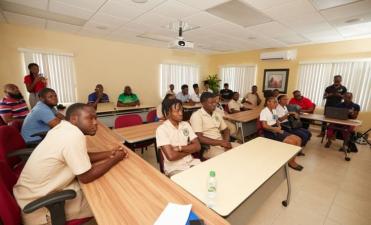
This year the WorldSkills Barbados (WSB) Programme celebrated five (5) years and the WorldSkills Barbados Competition celebrated 10 years! In recognition of these milestones, Lead Officer for the Programme Dario Walcott recaps where we have been and plans for the future.
1) What led to the establishment of the WorldSkills Programme here in Barbados?
WorldSkills Barbados is managed by the Technical and Vocational Education and Training Council - ie TVET Council (TVETC) - whose role is to promote and support competence-based technical and vocational education and training (i.e. TVET) which is educating / training, assessing and certifying to approved or recognised standards.
The international WorldSkills Programme also promotes and supports the use of occupational standards in the discipline of TVET. Hence, Barbados became an associate member of the WorldSkills organization in 2011, hosting the first national competition in 2012. We have been an active member, from the local biennial competitions to regional and international competitions. However, 2017 was a turning point.
After Barbados's performance at the international competition WorldSkills Abu Dhabi 2017, TVETC recognised that the TVET system required upgrades and transformation if Barbados was to ever perform well on the international stage. We recognised that our system had content and technology gaps compared to the WorldSkills standards and international requirements. So we had to make an effort to include other projects and aid in the development of young skilled professionals to ensure that they were more work ready.
2) Why is WSB important?
WorldSkills Barbados is important because it forces the training institutions to improve and remain current with global technology trends. For local competitions, WorldSkills International Test Projects are used and these require trainers to be competent in the Test Project requirements and provide learning opportunities for competitors who participate. Each skill competition has a Test Project that describes the work to be undertaken by Competitors to demonstrate occupational excellence. The Test Project must capture the context, purpose, processes, and outcomes of an occupation, and in doing so support the implementation of the Marking Scheme
To add, the WSB Programme provides professional development opportunities for local trainers and students in diverse areas. It helps TVET Council (TVETC) to target and positively influence younger students from as early as 11 years old.
3) What are the benefits of the WSB Programme?
Improved competence-based education and training (CBET) programmes with up-to-date technology meeting global industry standards. Improved student performance at each level in school and the workforce through competitions which promote and encourage skills excellence. Strengthened relationships with sectoral partners locally and internationally through training initiatives. Improved corporate image for TVETC. Professional development opportunities for trainers, instructors and students. Exposure to skills for the future for trainers and students.
4) What's the difference between the Programme and the competition?
The WorldSkills Barbados Competitions give students the opportunity to exhibit all the skills they've acquired during training against international Test Projects. The WSB programme provides developmental opportunities for stakeholders, in some cases to prepare them for competitions as well as for work. The programme is about improvement of the national TVET system through developmental initiatives.
5) What are some upcoming initiatives in which WSB is looking to get involved?
Expansion of the WorldSkills Barbados Juniors (WSBJ) Future Skills Camp, including new areas and providing certification opportunities for students. Working with the TVETC’s Lifelong Learning Unit to provide access to higher level training and certification opportunities to trainers and industry persons. Introducing a new skill competition to the programme in hopes of participation in Lyon 2024. Facilitating a regional skills competition.







